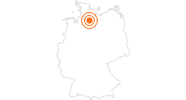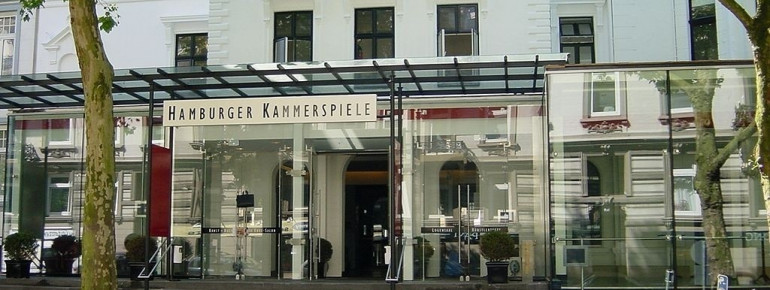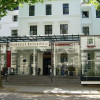Contents
Description
"Small but fine"
The Hamburger Kammerspiele is a small private theatre with renowned productions. The programme includes classical chamber play and modern classics, readings, political cabaret, song recitals and an annual Christmas play. The focus is on modern critical spoken theatre with contemporary drama.
Top-class cast
The cast of the Hamburg Kammerspiele productions is always top-class, including Karoline Eichhorn, Otto Sander, Helmut Zierl, Iris Berben, Andrea Sawatzki and many others.
Historical Information
The Haus der Hamburger Kammerspiele can also look back on an eventful history.
The town villa was built in 1863 by the merchant Otto Eduard Ferdinand Pfennig in the classicist style. From 1904 the Jewish Masonic Lodge met here, which had to sell the villa to the Antroposophical Society in 1930 due to the world economic crisis, but was allowed to continue using it. After its extension, the building became the centre of the Jewish community of Rotherbaum.
In 1941 the Jewish Cultural Association was liquidated by the National Socialists and the building was sold to the city of Hamburg.
After the Second World War, the Hamburg Kammerspiele was reopened under the direction of Ida Ehre. The idea was to run a "theatre of humanity and tolerance". Ida Ehre had been herself a prisoner in the Fuhlsbüttel concentration camp.
In the following decades, the theatre's management and concepts changed.
In 1995 Ulrich Tukur and Ulrich Waller brought well-known directors and actors to the theatre.
In the 2003/2004 season Axel Schneider and Dietrich Wersich took over the Hamburger Kammerspiele. They want to keep the profile and traditions of theatre alive with many premieres and first performances. In 2007/2008, the Hamburg Kammerspiele was the first private theatre to win the highly endowed Pegasus Prize.
How to get there
By public transport
You take the U1 to the stop Hallerstraße. Take the exit at the Multimedia-Center and then walk along the Rothenbaumchaussee until you reach the crossing Hartungstraße.
The express bus 34 stops at the bus station Völkerkundemuseum, from there you can also follow Rothenbaumchaussee towards Hallerstraße and then turn into Hartungstraße.
Take the S-Bahn (S11, S31, S21) to Dammtor station. Then take the exit Theodor-Heuss-Platz. There you take the bus line 4 or 5 to the station Grindelhof. It's a five-minute walk from here.



